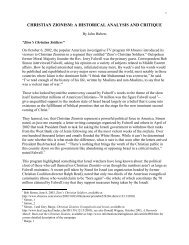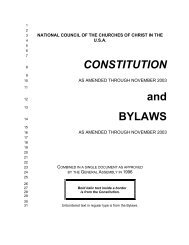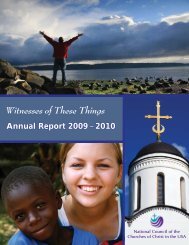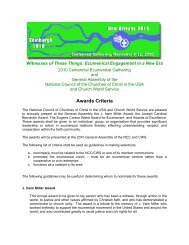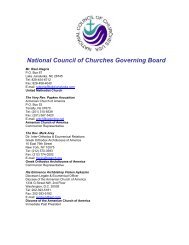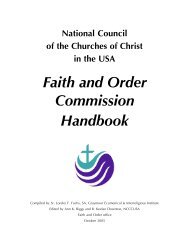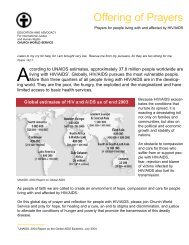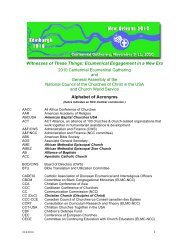Common Agreement on Mutual Recognition of Baptism - National ...
Common Agreement on Mutual Recognition of Baptism - National ...
Common Agreement on Mutual Recognition of Baptism - National ...
Create successful ePaper yourself
Turn your PDF publications into a flip-book with our unique Google optimized e-Paper software.
136<br />
137<br />
138<br />
139<br />
140<br />
141<br />
142<br />
143<br />
144<br />
145<br />
146<br />
147<br />
148<br />
149<br />
150<br />
151<br />
152<br />
153<br />
154<br />
155<br />
156<br />
157<br />
158<br />
159<br />
160<br />
161<br />
162<br />
163<br />
164<br />
165<br />
166<br />
167<br />
168<br />
169<br />
170<br />
171<br />
172<br />
173<br />
174<br />
175<br />
176<br />
177<br />
178<br />
179<br />
180<br />
Finally, the family has been a vital setting for dialogue between Roman Catholic and Reformed<br />
Christians in the United States. Increasingly, marriage and the mobility <strong>of</strong> extended families<br />
have c<strong>on</strong>tributed to this intimate encounter between the traditi<strong>on</strong>s, an experience which can be<br />
both a joy and sometimes also c<strong>on</strong>fusing. Families are the settings where the gifts that each<br />
traditi<strong>on</strong> brings can be most c<strong>on</strong>cretely received, but also the place where our differences can be<br />
most keenly felt, and where the pain <strong>of</strong> our divisi<strong>on</strong>s may have the most significant impact. It<br />
has been important, therefore, in <strong>of</strong>ficial settings, to approach with utmost care those topics<br />
which affect the experience <strong>of</strong> our members and the pastoral leaders who serve them.<br />
In all <strong>of</strong> these settings, both the Reformed and the Roman Catholic churches have affirmed the<br />
value <strong>of</strong> ecumenical engagement and increased mutual understanding. Through our <strong>on</strong>going<br />
encounter we have come to know each other‘s ecclesial characteristics, value each other‘s<br />
strengths, and make commitments to deeper relati<strong>on</strong>ships.<br />
We hope this study will provide an occasi<strong>on</strong> for <strong>on</strong>going dialogue am<strong>on</strong>g Roman Catholic and<br />
Reformed lay and ordained leaders, both in those places <strong>of</strong> l<strong>on</strong>gtime engagement, and in those<br />
settings where it will be entirely new. Such dialogue can c<strong>on</strong>tribute to the comm<strong>on</strong> witness <strong>of</strong><br />
the church <strong>on</strong> the local level, and make ecumenical ideas a lived reality <strong>of</strong> Christian faith.<br />
OUR HOPE<br />
It is precisely the gift <strong>of</strong> our unity in the church <strong>of</strong> Jesus Christ through our baptisms which<br />
enables us to come to dialogue tables not just as acquaintances but as kindred – as members <strong>of</strong><br />
<strong>on</strong>e family in Christ – to c<strong>on</strong>sider in depth these matters <strong>of</strong> baptismal theology and practice.<br />
The theological reflecti<strong>on</strong> in this report is intended to provide a sound basis <strong>on</strong> which our<br />
communi<strong>on</strong>s can express, in tangible ways, a mutual recogniti<strong>on</strong> <strong>of</strong> each other‘s baptisms. We<br />
have acknowledged areas <strong>of</strong> agreement and <strong>of</strong> difference. Through active engagement we have<br />
experienced our own faith traditi<strong>on</strong> more clearly by seeing ourselves through the lenses <strong>of</strong> our<br />
partners. Through dialogue we have become reacquainted with our own traditi<strong>on</strong>, the scriptures,<br />
and the sacraments. We have had the opportunity to examine, and, perhaps most important, to<br />
correct, past misunderstandings and caricatures. As our relati<strong>on</strong>ships have deepened we have<br />
celebrated those areas <strong>of</strong> theological c<strong>on</strong>sensus and we give thanks for the patient and careful<br />
dialogue which has brought our traditi<strong>on</strong>s closer together; we note those places where c<strong>on</strong>sensus<br />
has yet to be achieved but where <strong>on</strong>going dialogue holds promise for closer c<strong>on</strong>vergence; and we<br />
acknowledge those aspects <strong>of</strong> our theology and practice where there is no c<strong>on</strong>vergence but where<br />
the commitment to the eventual full, visible unity <strong>of</strong> the church will be well-served by enhanced<br />
mutual understanding.<br />
Through an h<strong>on</strong>est desire to understand each other, and therefore to acknowledge both the limits<br />
and the possibilities <strong>of</strong> what we can accomplish together, we believe we can make an enduring<br />
statement about what we hold in comm<strong>on</strong>.<br />
We <strong>of</strong>fer this report not simply as an academic study to be reviewed by those with a particular<br />
interest in the theology <strong>of</strong> baptism but to the entire c<strong>on</strong>stituency <strong>of</strong> all <strong>of</strong> our churches as a<br />
4



